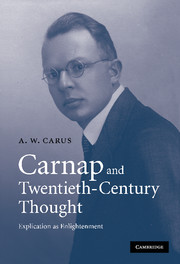Book contents
- Frontmatter
- Contents
- Preface
- Note on the style of citation
- Introduction
- 1 The cultural inheritance
- 2 The intellectual inheritance: positivism and Kantianism
- 3 The grand plan of a ‘system of knowledge’: science and logic
- 4 Carnap's early neo-Kantianism
- 5 The impact of Russell
- 6 Rational reconstruction
- 7 The impact of Wittgenstein
- 8 The crisis of rational reconstruction, 1929–1930
- 9 Liberation
- 10 Tolerance
- 11 The ideal of explication
- Bibliography
- Index
6 - Rational reconstruction
Published online by Cambridge University Press: 22 September 2009
- Frontmatter
- Contents
- Preface
- Note on the style of citation
- Introduction
- 1 The cultural inheritance
- 2 The intellectual inheritance: positivism and Kantianism
- 3 The grand plan of a ‘system of knowledge’: science and logic
- 4 Carnap's early neo-Kantianism
- 5 The impact of Russell
- 6 Rational reconstruction
- 7 The impact of Wittgenstein
- 8 The crisis of rational reconstruction, 1929–1930
- 9 Liberation
- 10 Tolerance
- 11 The ideal of explication
- Bibliography
- Index
Summary
Russell's Our Knowledge of the External World gave Carnap the key to his construction of a ‘total system of all concepts’. But other ramifications of this new beginning were less easily accommodated. One of the most important was to find an appropriate conception of the meta-perspective within which to locate the newly reconceived Aufbau project. It was during this period, between 1922 and his departure for Vienna in 1926, that Carnap arrived at the new conception of ‘rational reconstruction’. This programme gave the Encyclopédiste and positivist project of conceptual replacement a much more precise and vivid form than Comte or Ostwald had been able to give it. The main improvement over these previous versions was that Carnap applied to this task the Leibnizian idea (in Frege's form) of unifying knowledge deductively. Any particular proposed replacement of a folk concept, then, would exhibit the place of that concept within the entire system of knowledge. This meant that any such proposal could be articulated and discussed much more precisely than had ever been envisaged before; rational reconstruction could, in principle, be just as precise and scientific as scientific discourse itself. However, it took some years for Carnap to work this idea out. He had found his task in 1922, but much remained to be done.
THE TASK AND ITS COMPONENTS
Carnap's task, his new calling, actually consisted of two main subtasks.
- Type
- Chapter
- Information
- Carnap and Twentieth-Century ThoughtExplication as Enlightenment, pp. 161 - 184Publisher: Cambridge University PressPrint publication year: 2007



